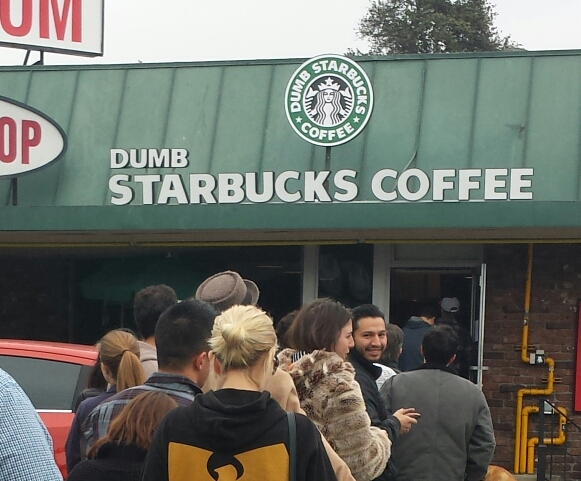Dumb Starbucks in Los Feliz February 12, 2014
Posted by lborodkin in : Uncategorized , add a commentA Dumb Starbucks opened in my neighborhood over the weekend.
The Guardian asked me to write an op-ed piece on it, so I did.
“Dumb Starbucks was the perfect crime, but Starbucks was smart to play dumb.”
A casual poll of my Los Feliz friends yielded a generally positive range of reactions. The stunt was funny, and timely. I had just attended a Digital LA panel on the future of Silicon Beach and Hollywood. In a world where there is a demonstrated consumer demand to skip through televison commercials (see Fox Broad. Co. v. Dish Network L.L.C., 2014 U.S. App. LEXIS 1657, 2014 WL 260572 (9th Cir. Cal. Jan. 24, 2014), a/k/a the “Dish Hopper” case), what is the future of the television commercial? I hope this is it.
I did find a funny typo in LEXIS misspelling Illinois’ anti-dilution statute as “antidelusion.” If only states could eliminate delusions so easily.
Anyway, the whole thing was a lot of fun, and I look forward to more terrible advice from Nathan and doomed retail establishments next to my dry cleaner.
Nathan Fielder says he’s going to open a Dumb Starbucks in Brooklyn next week. Let’s just hope it’s in Williamsburg.
This Week in Law Episode 243: OKScraping, Mugshot sites, and Big Content Watches You February 7, 2014
Posted by lborodkin in : Uncategorized , add a commentWe had a lot of fun recording Episode 243 of This Week in Law webcast with Denise Howell and Evan Brown. Among other stories in our rundown, I found the one about the lonesome computer programmer who “hacked” OKcupid.com to find his girlfriend particularly charming. No, I don’t think he violated the Computer Fraud and Abuse Act, but it’s fun to think about.
It’s also fun to think about the future of Bitcoin, which we also discussed. The two economists who appeared as the guests on This Week in Law 244 (Stan Liebowitz, James Miller) opined that Bitcoin is essentially a shell game until the regulators catch up with it.
But with insider traders like Mathew Martoma sucking value out of the regulated markets $245 million at a time, is it irrational to put one’s trust in those developing the Bitcoin protocol? There is no inherent connection to illegal activity. Transactions would be totally traceable in metadata, unlike with cash, as long as the transactions stay within the US.
Seems more like the bad risks driving out the good, if you view the financial markets as risk pools. We now have other options. I’d accept Bitcoin for services. Would you?






 del.icio.us
del.icio.us flickr
flickr LinkedIn
LinkedIn Twitter
Twitter


